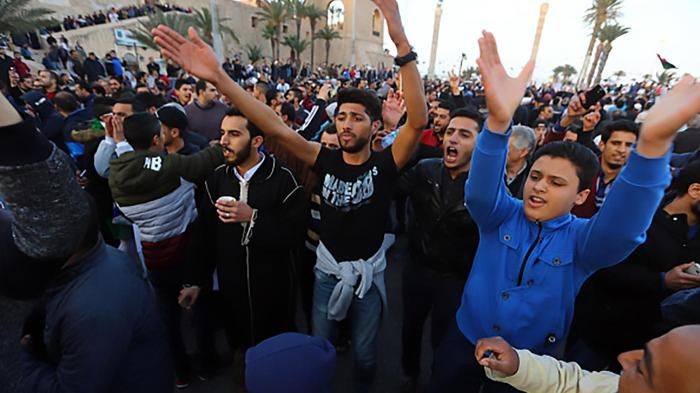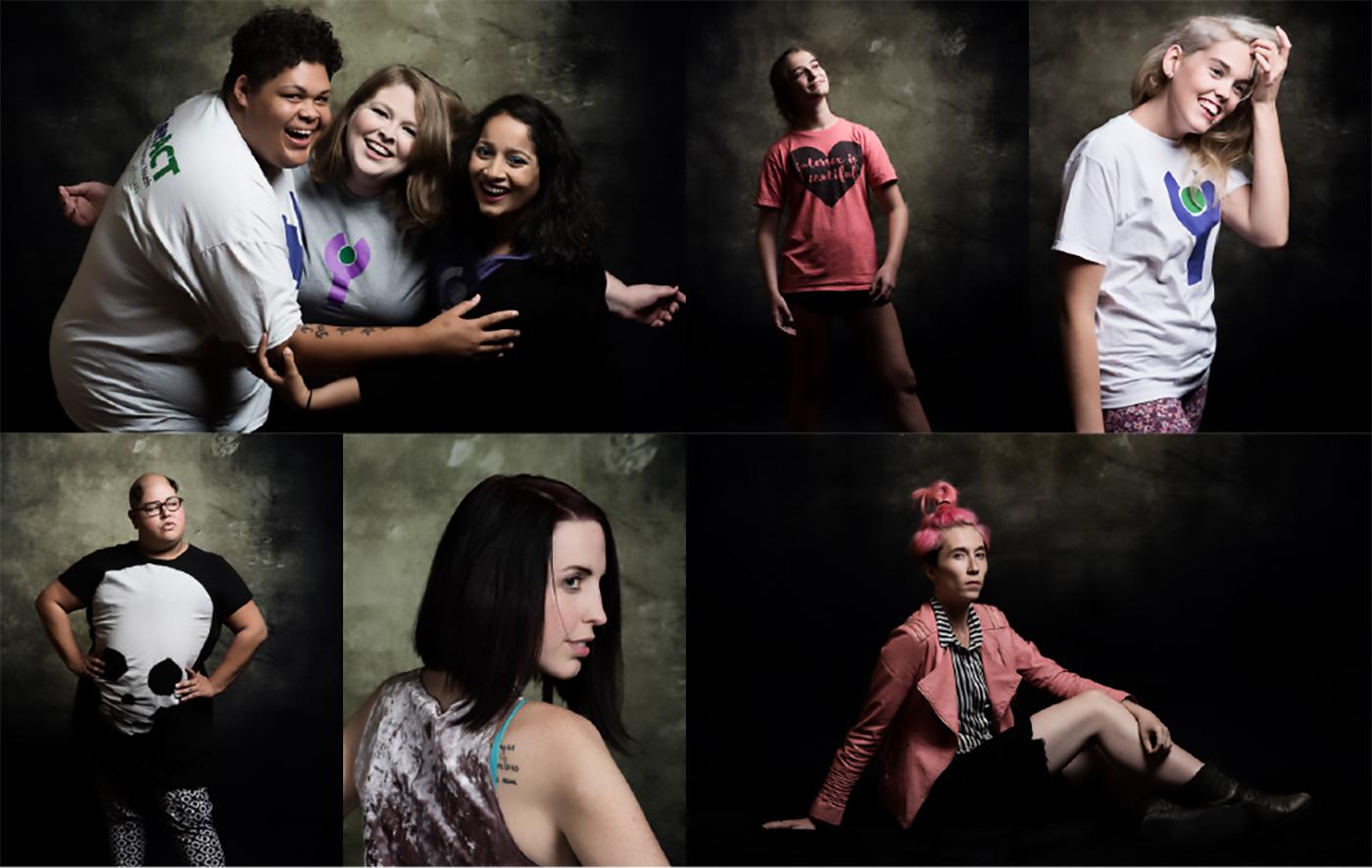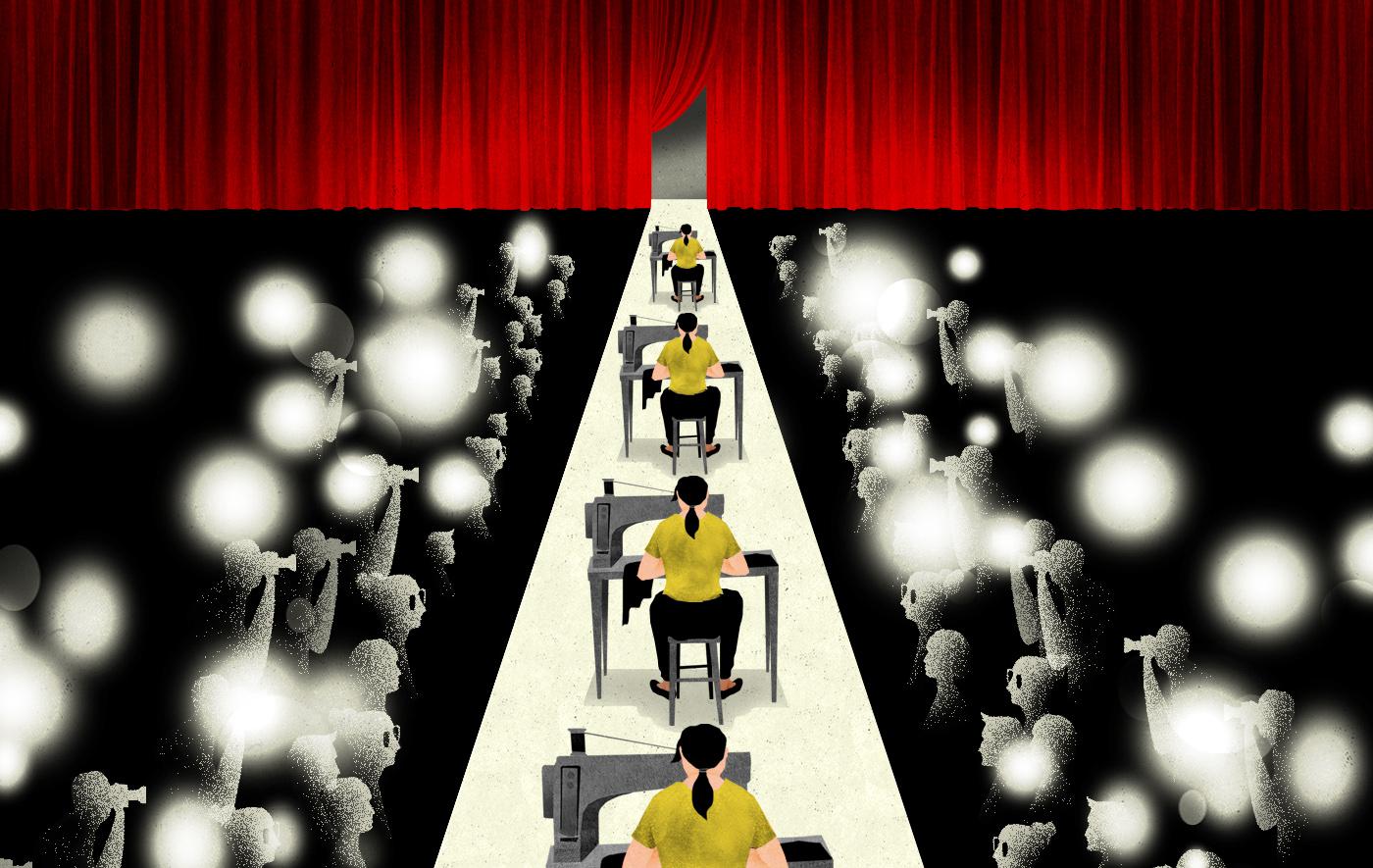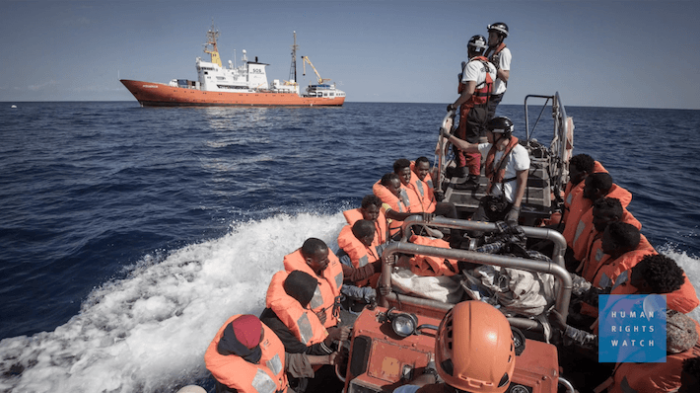Political divisions and armed strife continued to plague Libya as two governments vied for legitimacy and control of the country, and United Nations’ efforts to unify the feuding parties flagged. The UN backs the Government of National Accord (GNA), based in Tripoli, in the west, but not the rival Interim Government based in the eastern cities of al-Bayda and Benghazi.
Clashes between militias and forces loyal to these governments decimated the economy and public services, including the public health system, law enforcement, and the judiciary, and caused the internal displacement of over 200,000 people.
Armed groups throughout the country, some of them affiliated with one or the other of the competing governments, executed persons extrajudicially, attacked civilians and civilian properties, abducted and disappeared people, and imposed sieges on civilians in the eastern cities of Derna and Benghazi.
The extremist armed group Islamic State (also known as ISIS) lost control of its Libya “capital” Sirte in December 2016. In January 2017, remaining ISIS forces in Benghazi fled the city. ISIS-affiliated fighters remained present in areas south of Sirte and Bani Walid.
Most of the more than 200,000 migrants and asylum seekers who reached Europe by sea in 2017 departed in boats from Libya. Migrants and asylum seekers who ended up in detention in Libya faced beatings, extortion, sexual violence, and forced labor in unofficial and quasi state-run detention centers, at the hands of guards, militias, and smugglers. Coast guard forces also beat migrants they intercepted at sea and forced them back to detention centers with inhumane conditions. Between January and November, 2,772 migrants died during perilous boat journeys in the central Mediterranean Sea, most having departed from the Libyan shore.
Political Transition and Constitution
The GNA struggled to gain authority and control over territory and institutions. Between February and May, militias aligned with it overran positions in Tripoli held by militias that supported a third authority, the Government of National Salvation (GNS).
In the east, Libyan National Army forces (LNA), under the command of General Khalifa Hiftar and allied with the Interim Government, continued to expand control over territory in the east and south. Libya’s legislative body, the House of Representatives, remained allied with the LNA and Interim Government, and failed to approve a slate of ministers for the GNA.
Armed Conflict and War Crimes
In March, the LNA ended its siege of nearly two years on the Benghazi neighborhood of Ganfouda, which fighters of the Benghazi Revolutionaries Shura Council (BRSC) had controlled. When LNA forces entered, they committed what appeared to be war crimes, killing civilians and summarily executing and desecrating the bodies of opposition fighters.
On May 18, forces aligned with the GNA, including the Third Force from Misrata, the Benghazi Defense Brigades, and other local units from the south, attacked an LNA airbase at Brak Al-Shati, in the south of the country, summarily executing as many as 51 individuals, most of them LNA fighters captured during the attack.
Clashes between pro- and anti-GNA militias for the control of Tripoli lasted between March and May. Hostilities left many injured and resulted in the deaths of scores of fighters, and some civilians before militias and security forces aligned with the GNA took control of the capital.
Several videos recorded between June 2016 and July 2017 emerged on social media seemingly implicating LNA fighters in summary executions and the desecration of bodies of captured enemy fighters in eastern Libya. On August 15, the prosecutor of the International Criminal Court (ICC) issued an arrest warrant against Mahmoud al-Werfalli, an LNA commander implicated in these recordings. On August 18, the LNA announced they had arrested al-Werfalli for questioning. As of September, the LNA had not provided any update on the status of the alleged investigation against him.
On August 23, unidentified gunmen beheaded nine LNA fighters and two civilians in an attack on a LNA-controlled checkpoint in al-Jufra region. According to the LNA, ISIS carried out the attack.
In August, the LNA intensified a 14-month siege against the eastern city of Derna, which remained controlled by the Derna Mujahedeen Shura Council (DMSC), an alliance of armed groups that opposed Khalifa Hiftar and the LNA. Local council members, activists, and journalists reported on an impending humanitarian crisis in the city, where the LNA intermittently imposed strict measures that included cutting delivery of cooking gas, food items, and fuel.
On October 4, unidentified armed men including a suicide bomber, attacked a courthouse in Misrata where regular criminal proceedings were taking place, killing at least four and injuring several people. ISIS claimed it carried out the attack.
In October, unidentified forces conducted air strikes in Derna killing 16 civilians, including 12 children. There was no claim for responsibility.
Also in October, armed groups loyal to the LNA appear to have summarily executed 36 men in the LNA-controlled eastern town of al-Abyar.
Judicial System and Detainees
The criminal justice system has all but collapsed since 2014. Civilian and military courts in the east and south remained mostly shut, while elsewhere they operated at reduced capacity.
Prison authorities, often only nominally under the authority of the ministries of interior, defense, and justice of the two rival governments, continued to hold thousands of detainees in long-term arbitrary detention without charges. Militias that operated their own informal and often-secret detention facilities also held detainees in similar circumstances.
According to the Tripoli-based Judicial Police, the body responsible for managing prisons under the GNA Justice Ministry, 6,400 detainees were held in prisons managed by it in the east, west, and south of the country, of whom only 25 percent had been sentenced for a crime. The rest were held in pre-charge or pretrial detention. The Defense and Interior Ministries of both governments in Libya held an unknown number of detainees, in addition to militia-run secret detention facilities.
Hundreds of civilians, mostly women and children and including non-Libyan nationals, remain held without charge in two prisons in Tripoli and Misrata and in a camp run by the Libyan Red Crescent in Misrata for their apparent link to alleged ISIS fighters, without prospect for release due to their uncertain citizenship status and lack of coordination with countries of origin.
On May 26, The Tripoli Revolutionaries Brigade, a militia allied with the GNA Interior Ministry, overran the al-Hadba Correctional Facility in Tripoli and transferred from there to another location in Tripoli Gaddafi-era officials detained there, including former intelligence chief Abdullah Sanussi, former Prime Minister Abuzaid Dorda, and al-Saadi Gaddafi, a son of ousted Libyan leader Muammar Gaddafi.
International Criminal Court
The ICC prosecutor has a mandate to investigate war crimes, crimes against humanity, and genocide committed in Libya since February 15, 2011, pursuant to UN Security Council Resolution 1970.
In April, the ICC unsealed an arrest warrant for Mohamed Khaled al-Tuhamy, a former chief of the Internal Security Agency under Gaddafi, for war crimes and crimes against humanity during the 2011 uprising. His whereabouts were unknown at time of writing.
Saif al-Islam Gaddafi, a son of Gaddafi, continued to be subject to an arrest warrant issued by the ICC to face charges of crimes against humanity. In 2015, the Tripoli Court of Assize sentenced Gaddafi to death in absentia for crimes committed during the 2011 uprising. The Abu Baker al-Siddiq militia in Zintan, which had held him since 2011, reported it released him on June 9, 2017, citing an amnesty law issued passed by Libya’s parliament. His release could not be confirmed; independent international observers have not seen or heard from Gaddafi since June 2014.
Death Penalty
The death penalty is stipulated in over 30 articles in Libya’s penal code, including for acts of speech and association that are protected activities under international human rights law. Civil and military courts around the country have imposed the death penalty since the overthrow of Gaddafi in 2011, often after trials marred by due process violations. An unknown number of people were sentenced to death by Libyan civil and military courts since 2011, yet no death sentences have been carried out since 2010.
Internally Displaced Persons
The International Organization for Migration (IOM) estimated that 217,000 people were internally displaced in Libya as of September. According to the IOM, most displaced people originated from Benghazi, Sirte, Misrata, and Ubari.
Militias and authorities in Misrata continued to prevent 35,000 residents of Tawergha from returning to their homes, despite the announcement on June 19 by the GNA that it had ratified a UN-brokered agreement between them and Tawerghans to end their disputes and allow Tawerghans to return to their homes. Misrata representatives, who accused Tawerghans of having committed serious crimes as supporters of Libyan leader Muammar Gaddafi during the 2011 uprising that ousted him, demanded, as stipulated in the agreement, that the GNA establish a fund to compensate persons who had been detained and the families of victims who went missing or were killed, between February and August 2011. At time of writing, the GNA had yet to establish such a fund, and Misrata forces continued to block displaced families from returning to their homes in Tawergha.
According to the Benghazi municipal council based in “exile” in Tripoli, approximately 3,700 Benghazi families have been forcibly displaced since 2014 and have sought shelter in the western cities of Tripoli, Misrata, Khoms, and Zliten, after militias affiliated with the LNA threatened them, attacked, burnt or appropriated their homes, and accused them of being terrorists. Authorities in Misrata and Tripoli have detained a number of people displaced from Benghazi, often on dubious terrorism allegations. An additional 9,200 families from Benghazi were internally displaced in western Libya due to the conflict in the east.
Freedom of Speech and Expression
Armed groups intimidated, threatened, and physically attacked activists, journalists, bloggers, and media professsionals.
Security forces affiliated with the LNA in Benghazi arrested AFP photographer Abdullah Doma twice within one week—on March 28 and April 2—for a day each time. According to Doma’s family, the arrests were for his coverage of Earth Hour, a global event that took place on March 25 to raise awareness of climate change. Security forces also briefly arrested four of the organizers of the event, slamming it as “offensive to Islam” for allowing men and women to mix.
In August, members of militias and armed groups in both east and west Libya threatened in phone calls and on social media the contributors and editors of Sun on Closed Windows, a book of essays and fiction, accusing them of “immoral content.” Militias briefly arrested two participants in the book launch in the city of Zawiyah.
In November, a force affiliated with the GNA Interior Ministry, reportedly arrested participants of a comic book convention in Tripoli under the pretext that it breached the country's "morals and modesty."
Freedom of Religion
Since 2011, militias and forces affiliated with several interim authorities, as well as ISIS fighters, have attacked religious minorities, including Sufis and Christians, and destroyed religious sites in Libya with impunity.
In July 2017, the Supreme Fatwa Committee under the General Authority for Endowments and Islamic Affairs, the religious authority of the Interim Government, issued a religious edict calling the minority Ibadi sect of Islam “a misguided and aberrant group,” and “infidels without dignity.” The Ibadi faith is practiced by many Amazighs, mostly in western Libya. Amazighs number between 300,000 and 400,000 of Libya’s total population of 6.5 million. The GNA responded by condemning the religious edict.
In August, unidentified armed groups in Benghazi reportedly kidnapped or arrested 21 Sufi adherents, a minority Muslim group, at different times and different locations. As of September, none of the 21 had been released.
Women’s Rights, Sexual Orientation, and Gender Identity
Libyan law does not specifically criminalize domestic violence. Personal status laws continue to discriminate against women, particularly with respect to marriage, divorce, and inheritance. The penal code allows for a reduced sentence for a man who kills or injures his wife or another female relative because he suspects her of extramarital sexual relations. It also allows rapists to escape prosecution if they marry their victim under article 424.
On February 16, Abdelrazeq al-Nadhouri, chief of staff of the LNA, issued an order requiring women who wished to travel abroad by land, air, or sea to be accompanied by a male guardian. Al-Nadhouri rescinded the order on February 23 after public pressure, and replaced it with another order requiring all men and women ages 18 to 45 to acquire clearance by relevant security agencies ahead of any international travel from east Libya.
The penal code prohibits all sexual acts outside marriage, including same-sex relations, and punishes them with up to five years in prison.
Abductions and Enforced Disappearances
Militias linked with various government authorities in east and west of the country and criminal gangs kidnapped or forcibly disappeared scores of people for political gain, ransom, and extortion. Tripoli-based activist, Jabir Zain, remained missing after an armed group linked to the GNA Interior Ministery abducted him in Tripoli on September 25, 2016. Civil society activist Abdelmoez Banoon and Benghazi prosecutor Abdel-Nasser Al-Jeroushi, both abducted by unidentified groups in 2014, remained missing.
In August, an armed group affiliated with the GNA kidnapped former Prime Minister Ali Zeidan during a visit to Tripoli and released him nine days later.
Migrants, Refugees, and Asylum Seekers
Libya remained a major hub for refugees, asylum seekers, and migrants on their way to Europe. As of November, the IOM recorded over 161,010 arrivals to Europe by sea since January, most of whom departed from Libya. According to the UN Refugee Agency (UNHCR), at least 2,772 died or went missing while crossing the central Mediterranean route to Europe. As of November, the IOM reported that 348,372 migrants and asylum seekers were present in Libya.
Italy and the EU provided training and material support to Libyan coast guard forces to boost their capacity to intercept boats in territorial and international waters and return migrants and asylum seekers to Libyan territory, where many were exposed to physical abuse including beatings, sexual violence, extortion, abduction, harsh detention conditions, and forced labor.
In November, after revelations of alleged “slave auctions,” Rwanda offered to resettle 30,000 African “slaves” from Libya.
The Department for Combating Illegal Migration (DCIM), which is part of the GNA-aligned Interior Ministry, managed the formal migrant detention centers, while smugglers and traffickers ran informal ones.
Key International Actors
The United States announced in September 2016 that it had ended its military campaign against ISIS targets in Libya. In September 2017, the US conducted what it called “precision airstrikes” against purported ISIS targets south of Sirte. There were no reports of civilian casualties.
In June, the UN Security Council extended an arms embargo on Libya, effective since 2011, for another 12 months. On June 1, the UN Panel of Experts of the Libya Sanctions Committee, established pursuant to UN Security Council resolution 1973 (2011), issued its report on human rights abuses, violations of the arms embargo, and misappropriation of funds.
In February, the UN Support Mission to Libya published a report on the 2014 and 2015 trial proceedings against 37 former members of the Gaddafi government who were accused of crimes during the 2011 uprising, concluding that proceedings violated both international fair trial norms and Libyan law.
Members of the European Council met in Malta in February, and pledged to train, equip, and support Libyan coast guard forces, and, together with UNHCR and the IOM, improve reception capacities and conditions for migrants in Libya. The EU pledged a total of €200 million for migration-related projects in Libya to support migrant detention centers and coast guard forces, despite evidence of abuse.
In July, the EU Council extended the mandate of its anti-smuggling naval operation in the central Mediterranean, Operation Sophia, until December 2018. Operation Sophia’s mandate is to disrupt migrant smugglers and human traffickers, including training Libyan Coastguard and Navy forces, and contributing to the implementation of the UN arms embargo in international waters off Libya’s coast.
On July 25, France’s President Emmanuel Macron hosted a meeting between Libyan leaders Prime Minister Fayez Serraj and General Hiftar in a bid to break the stalemate between them. The meeting resulted in a declaration of principles, mainly to a conditional ceasefire, and plans for future elections.
In September, the EU renewed sanctions for six months against three Libyans seen as threatening the peace, security, and stability of Libya, and obstructive to the implementation of the LPA: Agila Saleh, president of the House of Representatives; Khalifa Ghweil, prime minister of the National Salvation Government; and Nuri Abu Sahmain, president of the self-declared General National Congress.






